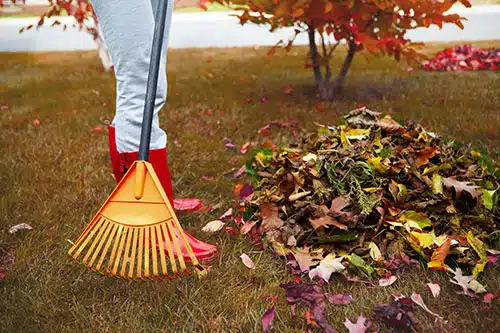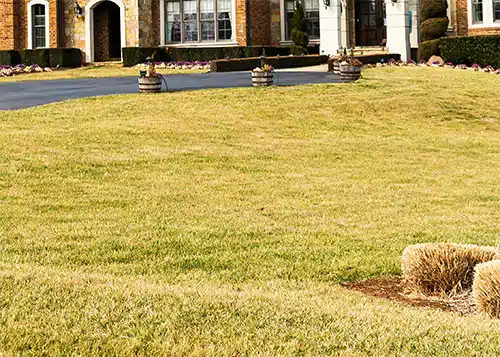As we brace for cold weather, it’s crucial to remember that winter lawn care is critical to maintaining a healthy, vibrant yard. While temperatures drop, your lawn requires specific care to survive and thrive. Let’s explore winter lawn care practices that protect and strengthen lawns against the harsh winter elements.
Winterize Your Lawn

Winter lawn care for your yard involves several key steps for protecting your yard during harsh winter conditions. These steps help prevent damage and disease to provide a solid foundation for your lawn’s health:
- Trim Trees: Reduce the risk of fallen branches and limit dead leaves by trimming trees.
- Rake Leaves: Regularly rake fallen leaves to prevent them from smothering the grass.
- Remove Debris and Outdoor Furniture: Keeping the lawn clear of debris and furniture helps the grass breathe and receive adequate sunlight.
- Final Mowing: Conduct a last mow about 0.5 inches taller than your regular fall cutting height, preparing the grass for colder weather.
- Protect Outdoor Shrubs During Freezing Temperatures: During a temporary or sudden cold snap, cover shrubs overnight with sheets, towels, or blankets to insulate them from the cold. A thick layer of mulch can also help plants retain heat.
Protect Dormant Grasses

Warm-season grasses like Bermuda and Zoysia, common in regions with milder winters, enter a dormant phase during the colder months. They conserve nutrients and energy during this time, turning brownish but not dying. It’s important to protect these warm-season grasses by following these winter lawn care tips:
- Avoid Foot Traffic: It’s crucial to minimize walking on dormant grass. Warm-season grasses cannot heal or regenerate effectively during dormancy, making them particularly vulnerable to damage. Avoid walking on the grass unless necessary; never walk on it when frozen. This helps prevent physical damage and maintains the integrity of the grass.
- Refrain from Heavy Equipment Use: Don’t use heavy equipment or park cars on dormant grass; it can compact the soil and damage the grass blades.
- Be Careful with Holiday Decorations: Avoid placing heavy holiday decorations on the lawn if you have warm-season grasses like Bermuda or Zoysia. These can compress and damage the grass.
- Avoid Using Rock Salt: Rock salt or sodium chloride can be toxic to plant roots and remove moisture from the soil. It can harm grass if it gets on your lawn from melted snow and ice. To mitigate this, consider alternatives like calcium chloride or magnesium chloride, which are less damaging to plants.
Deal with Winter Weeds and Pests
Managing winter weeds and pests is a crucial aspect of winter lawn care. During colder months, common weeds like Annual bluegrass, Henbit, Chickweed, and Swinecress thrive, taking advantage of the dormant state of warm-season grasses. You can hand pull or apply weed killers to combat these weeds on warmer winter days, as most herbicides are less effective in low temperatures. Choose the right herbicide for your type of grass and weeds, ensuring it’s safe for dormant grass.
Part of your winter lawn care routine should be to keep an eye out for winter lawn pests, which may find shelter in your lawn during mild winters. Common pests include grubs, which actively feed on grass roots. Watch for brown patches in tall fescue lawns and bare areas in warm-season lawns, which can indicate infestation. If you see signs of these pests, consider hiring a professional lawn care service to apply suitable pesticides. By staying vigilant and proactive in managing weeds and pests during the winter, you can maintain the health and appearance of your lawn, ensuring it’s ready for vigorous growth in the spring.
Winter Lawn Equipment Care

Winter lawn care routines should also include completing off-season equipment maintenance tasks. Proper care of lawn equipment in winter is essential for effective, trouble-free lawn maintenance in the coming year. Always follow the manufacturer’s guidelines for best results. Here are some quick tips to winterize your mower and sprinkler system:
Lawn Mower Maintenance:
- Empty the Gas Tank: Prevent fuel from stagnating and damaging the engine.
- Disconnect the Spark Plug: For safety and to prevent accidental starts.
- Clean and Sharpen Mower Blades: Ensures effective cutting in the spring.
- Drain the Oil: Replace it with fresh oil to keep the engine in good condition.
- Clean the Mower Undercarriage: Remove grass and debris to prevent rust.
- Change the Air Filter: To maintain engine efficiency.
- Store Safely: Keep the mower in a dry, protected area to avoid moisture damage.
Sprinkler System Care:
- Check Pipes and Sprinkler Heads: Inspect for damage and repair if necessary.
- Shut Off Water Supply: To prevent freezing and bursting of pipes.
- Drain Water from the System: Ensures no water is left to freeze and cause damage.
- Insulate Above-Ground Pipes: Protect against freezing temperatures.
- Turn Off Automated Settings: To prevent the system from running unnecessarily.
Wrapping Up: Your Guide to a Thriving Lawn This Winter
Discovering and implementing expert winter lawn care tips is essential for keeping your lawn vibrant and healthy during the cold months. By embracing the practices outlined in this guide, including winterizing your lawn, optimizing watering practices, and addressing winter weeds and pests, you ensure your lawn maintains its health and vitality. Remember, winter lawn care is crucial to your yard’s overall well-being and appearance.
For additional winter lawn care advice or professional services, contact Yardsy. Here, you’ll find extensive resources and expert guidance to help you achieve and maintain a beautiful lawn throughout the year.



















































